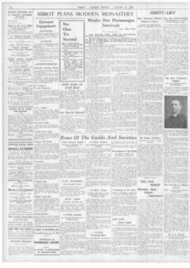Page 10, 13th January 1939
Page 10

Report an error
Noticed an error on this page?If you've noticed an error in this article please click here to report it.
Tags
Share
Related articles
Trying To Find Out What The Listener Wants
Radio
Looking And Listening
Looking And Listening
Listening
Plays that have ways
of overcoming
listeners' inability to see
AS a taste for the gruesome has been denied me I do not usually listen to plays described as "macabre" or 'bone-chilling." They either make me uncomfortable or disappoint me if they fail. But " The River Glideth " struck me as one of the best things I heard that week. The ghost go+ just the right note, with no overacting or false spookiness. The play was slight enough, but it purged with pity if not with terror.
The other play, " Death in the Crisis," was a neat thriller, but no more macabre than any of Inspector Hornleigh's murder cases. It is a tribute to that great, if somewhat fortunate, detective that I find myself hoping that all radio police will talk like him or the inimitable Bingham.
What did chill my bones was Robert Wyndham's broadcast in the first of " Tight Corners." After his bitter but salutary pillorying of the people who get their pleasure from risk to another man's life I shall watch my interest in the rest of this secies with some care. The gulf between a decent admiration for courage and something very unpleasant is a bit narrow sometimes, but it is very deep.
The next in the series will be Reg. Kavanagh on January 20.
P-T-HE River Glideth was self-contained and told its story without outside help. Another play that week was prefaced by a description of the scene. In yet another there was a narrator who did not break the listener'e mood, for as he was himself connected with the story he was not felt as an outsider.
These are three ways of overcoming the lislener's inanility to see, The best methocj es the one that succeeds, Racine kept az many rues as most dramatists, yet he wrote, The chief rule is to please and move. The only purpose of all the others is to achieve this," Number 17, the successor to The Front Page Men, is also told in the first person by Leon M. Lion as Ben. It is getting into its stride. The firet episode reminded me a little of the famous saying about the suspense of the author becoming well-nigh unbearable. It was wise to select a play quite different in kind from its predecessor. Even Inspector Hornleigh is in danger of proving that you can have too much of a good thing.
DANA Waggon keeps it popularity and spontaneity despite the fact that it has had an anniversary.
Monday Night at 7 seems to me to want overhauling. I found a family the other day in which it had ceased to amuse the adults but was still very popular with the children. I had to miss Famous Music Halls 7 to bear Arctic Excursion. This travel diary through Finnish Lapland with sound illustrations was one of the best feature programmes I have ever heard. More, please. The Island of Sark ran it close; but The Big Wind rather failed to get me.
Three books are being read serially: War and Peace, a very great novel which may thus reach many who would be intimidated by its sheer bulk, Sense and Sensibility, and Under the Greenwood Tree.
I have found a liking for these readings in people in whom I should not have expected it. They are fond of reading, but there is always sewing or some other quiet manual work to be done, so that the reading has to go. Now they can do both.
They like the short stories, too (I must come to these another week) and the talks.
ONE of the most interesting of the talk series is The Press To-day, which tells the listener what lies behind one of the big things of daily Me which he is apt to take for granted. Music and the Ordinary Listener is also run
blog comments powered by Disqus

















